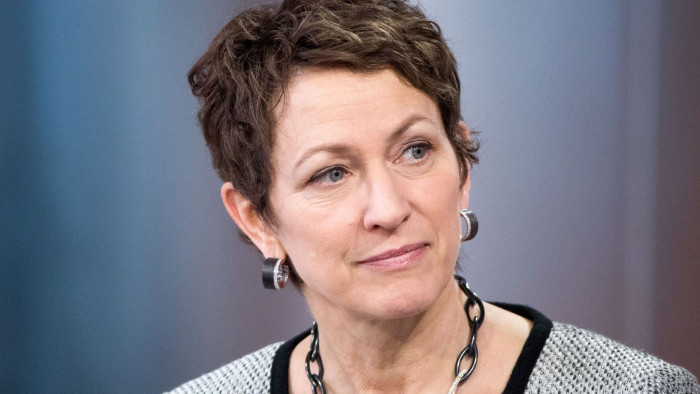Women executives demand legal quotas for females on boards

Roula Khalaf, Editor of the FT, selects her favourite stories in this weekly newsletter.
Top women executives called for legal quotas for females in the boardroom at an FT summit on Thursday in an uncompromising push to improve gender equality at UK listed companies.
Inga Beale, former head of Lloyd’s of London, and Tiina Lee, Deutsche Bank’s UK and Ireland chief executive, demanded the moves at the FT’s Women at the Top Conference in the capital.
“We’ve just got to do something, it’s not changing. I don’t even want to listen to rational arguments,” Ms Beale, who left Lloyd’s in 2018, said. ‘I’m quite extreme on this.”
In a thinly veiled swipe at her successors at Lloyd’s, she added: “I changed the [Lloyd’s] executive committee to 50/50 gender balanced. All the women I hired have now left.”
Ms Beale suggested framing quotas as “40 per cent men, 40 per cent women” to stress their focus on equality and boost their appeal.
Elizabeth Corley, chair of the Impact Investing Institute, also voiced support for quotas.
According to Cranfield University, which has been compiling data for 20 years, 32.1 per cent of FTSE 100 directors were women as of June 2019, up from 29 per cent in 2018. All FTSE 100 companies have at least one female director.
Women make up 38.9 per cent of non-executive directorships, but this falls to 25 per cent at executive positions. Women make up at least a third of directorships at 48 per cent of FTSE 100 groups.
McKinsey data indicates that British and American companies will not reach gender parity in boardrooms and other senior roles until 2040, and that progress has stalled altogether at 60 per cent of companies.
If all appointments were made with 50/50 gender representation starting today, then the gender gap would be gone by 2025.
However, there was not unanimous support for quotas.
Warren East, chief executive at Rolls-Royce, said he was opposed to legally mandated quotas but had instituted stringent voluntary targets at his group.
Jessica Ground, global head of stewardship at investment manager Schroders, described herself as neutral on quotas but called for public commitments on representation to be “weaponised”. For instance, shareholders might vote against all-male boards, or companies could link future access to lending facilities to meeting targets.
Ms Lee referred to “the myth of the meritocracy” and noted that, without senior women who can speak out, language and behaviour that excludes women often goes unchecked.
Ms Beale described how, even during her own recent tenure as Lloyd’s chief executive, junior women were called “box bitches” and “box bunnies,” referring to the boxlike offices that underwriters work from.
In a straw poll of the hundred-plus audience at the conference, primarily women in business, well over two-thirds indicated support for a legal quota.
Those advocating quotas on gender also noted that similar action was needed on race, sexuality and class.
The strength of feeling on the necessity for legal quotas underlines the view among many that progress on gender representation appears slow and faltering.
Ms Ground stressed that legal pressure could help gender representation in other ways. “One of the best things the regulator ever did was ban golf days,” she said.
Comments